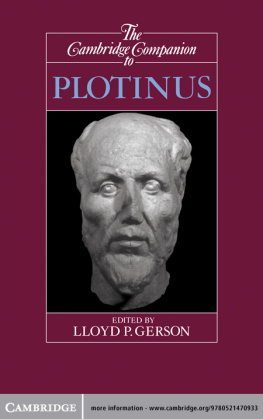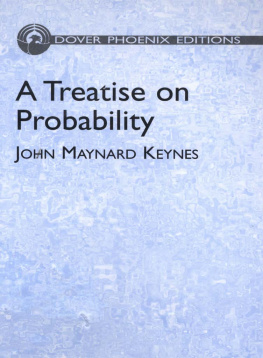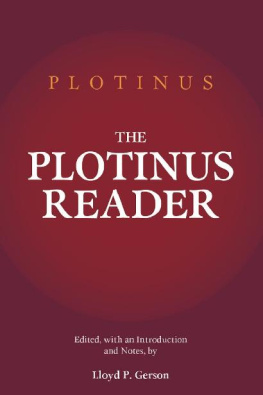
THE ENNEADS OF PLOTINUS
With Philosophical Commentaries
Series Editors: John M. Dillon, Trinity College, Dublin
and Andrew Smith, University College, Dublin
A LSO A VAILABLE IN THE S ERIES :
Ennead IV.8: On the Descent of the Soul Into Bodies
by Barrie Fleet
Ennead V.5: That the Intelligibles are not External
to Intellect, and on the Good
by Lloyd P. Gerson
F ORTHCOMING T ITLES IN THE S ERIES INCLUDE :
Ennead I.2: On Virtues by Suzanne Stern-Gillet
Ennead I.6: On Beauty by Andrew Smith
Ennead II.4: On Matter by Anthony A. Long
Ennead II.5: On What Exists Potentially and What Actually
by Cinzia Arruzza
Ennead II.9: Against the Gnostics
by Sebastian Ramon Philipp Gertz
Ennead III.8: On Nature and Contemplation
by George Karamanolis
Ennead IV.34.29: Problems Concerning the Soul
by John M. Dillon and J. H. Blumenthal
Ennead IV.12, IV.4.3045 & IV.5:
Problems Concerning the Soul
by Gary Gurtler
Ennead IV.7: On the Immortality of the Soul
by Barrie Fleet
Ennead V.1: On the Three Primary Levels of Reality
by Eric D. Perl
Ennead V.8: On Intelligible Beauty
by Andrew Smith
Ennead VI.8: On Free Will and the Will of the One
by Kevin Corrigan and John D. Turner

PARMENIDES PUBLISHING
Las Vegas | Zurich | Athens
2015 Parmenides Publishing. All rights reserved.
This edition published in 2015 by Parmenides Publishing in the United States of America
ISBN soft cover: 978-1-930972-34-6
ISBN e-Book: 978-1-930972-14-8
Library of Congress Cataloging-in-Publication Data
Plotinus.
[Ennead. VI. 4-5. English]
Ennead VI.4 and VI.5: on the presence of being, one and the same, everywhere as a whole/PLOTINUS; translation with an introduction and commentary, EYJLFUR K. EMILSSON and STEVEN K. STRANGE.
pages cm. -- (The Enneads of Plotinus with philosophical commentaries)
Includes bibliographical references and index.
ISBN 978-1-930972-34-6 (pbk.: alk. paper) -- ISBN 978-1-930972-14-8 (e-book)
1. Soul--Early works to 1800. 2. Plotinus. Ennead. VI. 4-5. I. Eyjlfur Kjalar Emilsson. II. Strange, Steven K. III. Title. IV. Title: On the presence of being, one and the same, everywhere as a whole.
B693.E52E5 2014
186.4--dc23
2014025565
Typeset in Janson Text & Frutiger by Parmenides Publishing
Printed and lay-flat bound by Documation Inc. | www.documation.com
www.parmenides.com
Contents
Introduction to the Series
With a Brief Outline of the Life and
Thought of Plotinus (205270 CE)
P LOTINUS WAS BORN IN 205 CE in Egypt of Greek-speaking parents. He attended the philosophical schools in Alexandria where he would have studied Plato (427347 BCE), Aristotle (384322 BCE), the Stoics and Epicureans as well as other Greek philosophical traditions. He began his serious philosophical education, however, relatively late in life, at the age of twenty-seven and was deeply impressed by the Platonist Ammonius Saccas about whom we, unfortunately, know very little, but with whom Plotinus studied for some eleven years. Even our knowledge of Plotinus life is limited to what we can glean from Porphyrys introduction to his edition of his philosophical treatises, an account colored by Porphyrys own concerns. After completing his studies in Alexandria Plotinus attempted, by joining a military expedition of the Roman emperor Gordian III, to make contact with the Brahmins in order to learn something of Indian thought. Unfortunately Gordian was defeated and killed (244). Plotinus somehow managed to extract himself and we next hear of him in Rome where he was able to set up a school of philosophy in the house of a high-ranking Roman lady by the name of Gemina. It is, perhaps, surprising that he had no formal contacts with the Platonic Academy in Athens, which was headed at the time by Longinus, but Longinus was familiar with his work, partly at least through Porphyry who had studied in Athens. The fact that it was Rome where Plotinus set up his school may be due to the originality of his philosophical activity and to his patrons. He clearly had some influential contacts, not least with the philhellenic emperor Gallienus (253268), who may also have encouraged his later failed attempt to set up a civic community based on Platonic principles in a ruined city in Campania.
Page No: 1
Plotinus school was, like most ancient schools of philosophy, relatively small in scale, but did attract distinguished students from abroad and from the Roman upper classes. It included not only philosophers but also politicians and members of the medical profession who wished to lead the philosophical life. His most famous student was Porphyry (233305) who, as a relative latecomer to the school, persuaded him to put into writing the results of his seminars. It is almost certain that we possess most, if not all, of his written output, which represents his mature thought, since he didnt commence writing until the age of forty-eight. The school seemingly had inner and outer circles, and Plotinus himself was clearly an inspiring and sympathetic teacher who took a deep interest in the philosophical and spiritual progress of his students. Porphyry tells us that when he was suffering from severe depression Plotinus straight away visited him in his lodgings to help him. His concern for others is also illustrated by the fact that he was entrusted with the personal education of many orphans and the care of their property and careers. The reconciliation of this worldly involvement with the encouragement to lead a life of contemplation is encapsulated in Porphyrys comment that he was present to himself and others at the same time.
Page No: 2
The Enneads of Plotinus is the edition of his treatises arranged by his pupil Porphyry who tried to put shape to the collection he had inherited by organizing it into six sets of nine treatises (hence the name Enneads ) that led the reader through the levels of Plotinus universe, from the physical world to Soul, Intellect and, finally, to the highest principle, the One. Although Plotinus undoubtedly had a clearly structured metaphysical system by the time he began committing himself to expressing his thought in written form, the treatises themselves are not systematic expositions, but rather explorations of particular themes and issues raised in interpreting Plato and other philosophical texts read in the School. In fact, to achieve his neat arrangement Porphyry was sometimes driven even to dividing certain treatises (e.g., II.23; IV.35, and VI.45).
Page No: 3
Although Plotinus writings are not transcripts of his seminars, but are directed to the reader, they do, nevertheless, convey the sort of lively debate that he encouraged in his school. Frequently he takes for granted that a particular set of ideas is already familiar as having been treated in an earlier seminar that may or may not be found in the written text. For this reason it is useful for the reader to have some idea of the main philosophical principles of his system as they can be extracted from the Enneads as a whole.
Plotinus regarded himself as a faithful interpreter of Plato whose thought lies at the core of his entire project. But Platos thought, whilst definitive, does according to Plotinus require careful exposition and clarification, often in the light of other thinkers such as Aristotle and the Stoics. It is because of this creative application of different traditions of ancient thought to the interpretation of Plato that Plotinus version of Platonism became, partly through the medium of later Platonists such as Porphyry, Iamblichus (245325), and Proclus (412485), an influential source and way of reading both Plato and Aristotle in the Middle Ages, the Renaissance, and up to the early 19th century, when scholars first began to differentiate Plato and Neoplatonism. His thought, too, provided early Christian theologians of the Latin and particularly of the Byzantine tradition, with a rich variety of metaphysical concepts with which to explore and express difficult doctrinal ideas. His fashioning of Platos ideas into a consistent metaphysical structure, though no longer accepted as a uniquely valid way of approaching Plato, was influential in promoting the notion of metaphysical systems in early modern philosophy. More recently increasing interest has centered on his exploration of the self, levels of consciousness, and his expansion of discourse beyond the levels of normal ontology to the examination of what lies both above and beneath being. His thought continues to challenge us when confronted with the issue of mans nature and role in the universe and of the extent and limitations of human knowledge.














